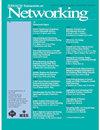OBMA: Scalable Route Lookups With Fast and Zero-Interrupt Updates
IF 3.6
3区 计算机科学
Q2 COMPUTER SCIENCE, HARDWARE & ARCHITECTURE
引用次数: 0
Abstract
Software-based IP route lookup is a key component for packet forwarding in Software Defined Networks. Running lookup algorithms on commodity CPUs is flexible and scalable, which shows advantages on cost and power consumption over the hardware-based forwarding engines. However, dynamic network functions and services make route updates more frequent than ever. Existing algorithms often fall short of the incremental update requirements. In this paper, we propose the Overlay BitMap Algorithm (OBMA), which contains several variations, to support extraordinary update performance while maintaining the highest-in-class lookup speed and storage efficiency. Starting from the basic OBMA_B, we develop two variations with different tradeoffs for different application scenarios. OBMA_L supports faster lookups than OBMA_B at a small cost of update speed. OBMA_S achieves better storage efficiency than OBMA_B at a small cost of lookup throughput. We run our algorithms on a commodity CPU and evaluate them with real-world route tables and traces. The experiments show that OBMA achieves the lowest memory footprint, the highest update speed, and over 200 Mpps lookup throughput. Specifically, OBMA_S reduces the memory footprint to 3.98 bytes/prefix which is 25.33% smaller that of the state-of-the-art Poptrie; OBMA_L supports 252.02 Mpps lookup throughput with a single thread, and more than 600 Mpps with multiple parallel threads in a single CPU, significantly outperforming the state-of-the-art Poptrie and SAIL; OBMA_B supports updates at a rate of 14.58M updates/s which is 15 times faster than Poptrie. The tests show that the update process has little interference with the lookup process for OBMA, and achieves zero-interrupt to lookups with multiple threads.具有快速和零中断更新的可扩展路由查找
基于软件的IP路由查找是软件定义网络中报文转发的关键组成部分。在商用cpu上运行查找算法具有灵活性和可扩展性,与基于硬件的转发引擎相比,在成本和功耗方面具有优势。然而,动态的网络功能和服务使得路由更新比以往更加频繁。现有的算法往往不能满足增量更新的要求。在本文中,我们提出了覆盖位图算法(OBMA),它包含几个变体,以支持非凡的更新性能,同时保持最高的查找速度和存储效率。从基本的OBMA_B开始,我们为不同的应用程序场景开发了两个具有不同权衡的变体。OBMA_L支持比OBMA_B更快的查找,而更新速度的代价很小。OBMA_S以较小的查找吞吐量为代价,实现了比OBMA_B更好的存储效率。我们在一个商品CPU上运行我们的算法,并用真实世界的路由表和轨迹对它们进行评估。实验表明,OBMA实现了最低的内存占用、最高的更新速度和超过200 Mpps的查找吞吐量。具体来说,OBMA_S将内存占用减少到3.98字节/前缀,比最先进的Poptrie小25.33%;OBMA_L支持单个线程的252.02 Mpps查找吞吐量,在单个CPU中支持多个并行线程的600 Mpps查找吞吐量,显著优于最先进的Poptrie和SAIL;OBMA_B支持14.58M更新/s的速度,比Poptrie快15倍。测试表明,更新过程对OBMA查找过程的干扰很小,实现了多线程查找的零中断。
本文章由计算机程序翻译,如有差异,请以英文原文为准。
求助全文
约1分钟内获得全文
求助全文
来源期刊

IEEE/ACM Transactions on Networking
工程技术-电信学
CiteScore
8.20
自引率
5.40%
发文量
246
审稿时长
4-8 weeks
期刊介绍:
The IEEE/ACM Transactions on Networking’s high-level objective is to publish high-quality, original research results derived from theoretical or experimental exploration of the area of communication/computer networking, covering all sorts of information transport networks over all sorts of physical layer technologies, both wireline (all kinds of guided media: e.g., copper, optical) and wireless (e.g., radio-frequency, acoustic (e.g., underwater), infra-red), or hybrids of these. The journal welcomes applied contributions reporting on novel experiences and experiments with actual systems.
 求助内容:
求助内容: 应助结果提醒方式:
应助结果提醒方式:


